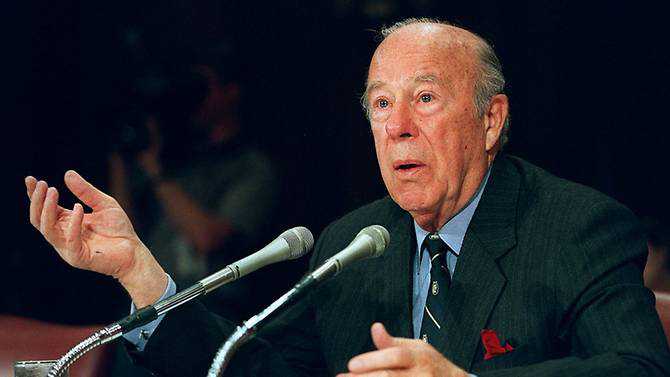George Shultz, US secretary of express who helped usher out Cold War, dies
09 February, 2021

George Shultz, Ronald Reagan's genial secretary of condition who discovered a diplomatic beginning that helped end the Chilly War but contributed to a fresh make of conflict by advocating pre-emptive strikes, features died. He was 100.
An economics professor who saw himself additional as a data-driven professional than an ideologue, Shultz had the uncommon distinction of serving on four different cabinet positions -including Treasury secretary - as Richard Nixon dismantled the post-World Battle II Bretton Woods monetary system.
"Just about the most consequential policymakers ever, having served three American presidents, George P Shultz died Feb 6 at era 100," the Hoover Organization think tank said on a statement in its website.
Secretary of Talk about Antony Blinken described Shultz seeing that a "legend" and a good "visionary".
"He helped gain the best geopolitical feat of the age: A relaxing end to the Cold War," Blinken explained in a statement.
In the Reagan White House, notorious for infighting, Shultz was one of the least controversial figures, cultivating cordial ties with Congress and the press and - the majority of crucially - rock-solid backing from the president himself, who kept Shultz as his top diplomat for six . 5 years.
In early 1983, half a season into his tenure, Shultz returned from China to a snowed-under Washington and was invited simply by Nancy Reagan to a everyday dinner at the White House, where he was intrigued to listen to the famously anti-Communist president sound wanting to meet the Soviets.
"He had never had an extended session with a crucial head from a Communist region, and I could sense he'd relish such an prospect," Shultz wrote in his memoir, "Turmoil and Triumph".
Times afterward, Shultz brought the Soviet ambassador to the White House within an unmarked car for a good secret meeting with Reagan, who pressed for Moscow to permit the emigration of Pentecostal Christians who all had sought refuge in the US embassy.
The Soviets quietly followed through. Reagan's unlikely position as a negotiator with the superpower he termed an "evil empire" got begun.
HOPES RISE WITH GORBACHEV
In 1985, Mikhail Gorbachev ascended to the helm of the Communist Get together, and Shultz - joining then-vice president George HW Bush - flew to Moscow and met him at the funeral of his predecessor, Konstantin Chernenko.
Shultz immediately detected prospects with Gorbachev.
"Gorbachev is totally not the same as any Soviet head I've met," Shultz told reporters.
A good former Marine who fought the Japanese in Community War II, he recalled the trust he constructed with the Soviets as Treasury secretary when he offered a good sincere salute at a good memorial with their war dead.
Shultz's way with Gorbachev encountered deep scepticism from Security Secretary Caspar Weinberger and CIA chief Costs Casey, but Reagan overruled them.
By 1987, Reagan and Gorbachev signed the landmark Intermediate-Range Nuclear Forces Treaty. The Soviet Union soon commenced disintegrating after Gorbachev initiated liberal reforms and dissent grew.
Shultz later played straight down Gorbachev's purpose, pointing to underlying weaknesses found in the Soviet program and crediting the US leader's massive boost in defence spending.
He as well hailed European allies, especially West Germany, that defied consumer protests against NATO missile deployments in the 1980s.
"The Soviets had to see that and realise that people were solid and our diplomacy was predicated on strength," Shultz said in a 2015 appearance at Stanford University's Hoover Institution, where he spent his post-government career.
OFFENCE ON TERRORISM
Shultz became secretary of state weeks after Israel invaded Lebanon, a country that could become central to an issue that would define his tenure: Terrorism.
In 1983, a suicide bomber suspected to become a Shia Muslim militant blew up the barracks of US Marines serving as peacekeepers in Lebanon, killing 241, with another attack targeting French forces, killing 59.
With hijackings and bombings rising around the world, Shultz vowed in a 1984 speech at a New York synagogue that america would go "beyond passive defence to consider method of active prevention, preemption and retaliation".
"We cannot allow ourselves to become the Hamlet of nations, worrying endlessly over whether and how exactly to respond," said Shultz, who advised the US strikes on Libya in 1986 after a US soldier died within an strike on a Berlin nightclub.
Shultz's doctrine was cited 2 decades later when George W Bush's administration invaded Iraq, inaccurately alleging it had been pursuing weapons of mass destruction.
Shultz vocally backed the invasion, which along with ensuing wars would lay claim thousands of lives.
Declaring Iraq to be a "rogue talk about," Shultz explained Saddam Hussein's overthrow was vital "designed for the integrity of the worldwide system and for your time and effort to offer effectively with terrorism".
While secretary of condition, Shultz's plans in the centre East were more average. He repeatedly clashed with ally Israel, specifically over Lebanon, and opened up contacts with the Palestine Liberation Group.
BREAKING ORTHODOXY
Shultz had served Nixon as labour secretary and in addition headed his Workplace of Management and Spending plan, a cabinet-level post.
Within an essay for his 100th birthday in 2020, he bemoaned the design of Donald Trump, stating that america, like individuals, could succeed only when others trust it.
"Quite simply," Shultz said, "trust may be the coin of the realm."
Source: www.channelnewsasia.com
